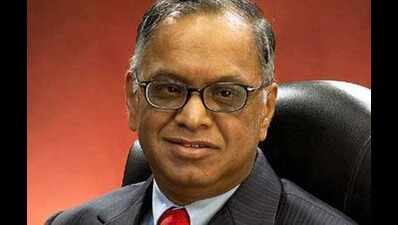- News
- City News
- bengaluru News
- Exclusive interview with N R Narayana Murthy
Trending
This story is from November 23, 2017
Exclusive interview with N R Narayana Murthy

N R Narayana Murthy .

Excerpts.
Q: Thousands of crores are pumped into the education sector every year. Yet we had Bill Gates saying India needs to do better. Where are we going wrong ?
A: While I am a voter for social justice, the answer to that is not just legislation. It’s very easy to legislate, but that model hasn’t worked. There is no arguing that a large number of children and communities need encouragement as they have been neglected for years. But the flaw is in the way we are doing it. If we want the disadvantaged to progress, we need to have the best teachers, best schools, best midday meal, best textbooks for them in rural areas. We are not doing that. Governments must focus on creating an environment for the disadvantaged to progress, rather than throw them into the current system and boast of social justice.

Q: Engineering, a profession that was once the most sought after, is no more the only option for today’s kids. Why is the profession losing its sheen?
A: Clearly, the industry needs to be blamed for this. Salaries haven’t changed for seven or eight years now for fresh graduates and cost of living is going up. Why would youngsters want to choose a job that is taxing but not rewarding? The biggest challenge for corporates today is to keep freshers and youngsters content in their jobs. We should not repeat what we did with the pure science sector. We really need to work hard.
Q; India's higher educational institutions do not figure even in the top 200 in world rankings. Why?
I have been saying that there is nothing wrong with our IITs and IIMs. But only 20% of our students graduate from here and make it big. What about the remaining 80%? The fundamental issue is that our universities and the education system do not focus on resolving issues concerning citizens’ lives. How many of our civil engineering colleges/students will be able to fix our road infrastructure? Whether it is the smog in Delhi, potholes in Bengaluru’s or inventing cure for dengue/chikungunya, we have no answers from our universities. That’s where we lose out to universities globally.
Q: Modi’s Make In India seems to have some answers to rejigging the rural economy and creating jobs....
A: It’s a great initiative. But his thoughts must be matched with the bureaucracy and state governments at the ground level. Today, a small entrepreneur has to run around to get his electricity and water connections. If we make things difficult for them, it won’t work. Small industries will lose interest. We must shift tax exemptions from big corporates to small industries . Unless the environment is conducive, nothing can grow.
Q: Today, in many sectors, the friction seems to be between private vs government. The recent revolt by private hospital doctors is a case in point.
A: There is no doubt that at the core of these frictions — whether in education or healthcare — lies transparency. Being transparent is the key. Having said that, it’s not right for anyone to expect private hospitals to charge less when they spend so much on their enterprises. You cannot expect a hospital, which spends lakhs to bring a medical equipment from another country, to charge Rs 100 from a patient. Where is the logic?
Tech czar feted
N R Narayana Murthy has been conferred the 2018 IEEE Founders Medal for his outstanding contributions towards leadership, planning, and administration in the electrical and electronics engineering profession. For nearly a century, the IEEE ( Institute of Electrical and Electronics Engineers) has honoured researchers, inventors, innovators, and practitioners, whose exceptional achievements and outstanding contributions have made a lasting impact on technology, society, and the engineering profession.
End of Article
FOLLOW US ON SOCIAL MEDIA








